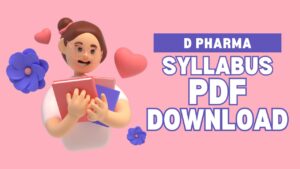D Pharm Syllabus

Introduction to D. Pharm
The Diploma in Pharmacy (D. Pharm) is a foundational course in the field of pharmacy. This two-year program equips students with essential knowledge and practical skills required to excel in the pharmaceutical industry. The curriculum is designed to provide a blend of theoretical understanding and practical training, ensuring that students are well-prepared to meet the demands of the healthcare sector.
Course Duration and Structure
The D. Pharm course is structured over two academic years, each consisting of a minimum of 180 working days. In addition to the classroom education, students must undergo 500 hours of practical training, which spans at least three months. This practical experience is critical in developing hands-on skills in pharmaceutical practices.
Eligibility Criteria
To enroll in the D. Pharm program, candidates must have completed their 10+2 education with Science subjects, including Physics, Chemistry, Biology, or Mathematics. Admission is typically based on merit, determined by performance in a Pre-Pharmacy Test or equivalent examinations recognized by the Pharmacy Council of India.
D Pharma Syllabus PDF Download
Year 1: Diploma in Pharmacy Part-I
Subjects Covered:
- Pharmaceutics-I
- Focus on different dosage forms, drug delivery systems, and the study of pharmacopoeias.
- Practical aspects include preparation of various pharmaceutical forms like aromatic waters, solutions, tinctures, and more.
- Pharmaceutical Chemistry-I
- Inorganic pharmaceutical chemistry, covering acids, bases, buffers, antioxidants, and gastrointestinal agents.
- Practical sessions emphasize identification tests, limit tests, and assays of inorganic pharmaceuticals.
- Pharmacognosy
- Study of drugs derived from natural sources, including their classification, therapeutic effects, and pharmaceutical applications.
- Practical work involves the identification of drugs by morphological characteristics and microscopic studies.
- Biochemistry and Clinical Pathology
- Overview of biochemistry with a focus on proteins, carbohydrates, lipids, and enzymes.
- Practical sessions include detection of biomolecules and analysis of normal and abnormal constituents in blood and urine.
- Human Anatomy and Physiology
- Detailed study of the human body’s structure and function, including the cardiovascular, respiratory, urinary, and nervous systems.
- Practical exercises involve the examination of human skeletons, blood films, and the measurement of vital signs like blood pressure.
- Health Education and Community Pharmacy
- Covers concepts of health, disease prevention, nutrition, first aid, and epidemiology.
- Practical aspects focus on first aid techniques and understanding community health issues.
Year 2: Diploma in Pharmacy Part-II
Subjects Covered:
- Pharmaceutics-II
- Advanced dispensing pharmacy, including the preparation of various dosage forms like powders, liquids, ointments, and sterile products.
- Emphasis on practical skills in dispensing medications, managing incompatibilities, and handling sterile preparations.
- Pharmaceutical Chemistry-II
- Focus on organic pharmaceutical compounds, including antiseptics, antibiotics, sulphonamides, and more.
- Practical sessions involve qualitative testing of organic drugs, identification tests, and preparation of simple organic compounds.
- Pharmacology & Toxicology
- Introduction to pharmacology, drug action mechanisms, and the study of drugs affecting the central nervous system, cardiovascular system, and more.
- Practical exercises include studying drug effects on various organ systems and testing for pyrogens.
- Pharmaceutical Jurisprudence
- Covers pharmaceutical laws, ethics, and regulations governing the practice of pharmacy in India.
- The syllabus includes the study of the Pharmacy Act, Drugs and Cosmetics Act, and other related legislation.
- Drug Store and Business Management
- Introduction to commerce, management principles, inventory control, and financial management in a pharmacy setting.
- Practical aspects include understanding accounting concepts, ledger maintenance, and budget preparation.
- Hospital and Clinical Pharmacy
- Focus on the role of pharmacy in hospitals, including drug distribution systems, sterile manufacturing, and clinical pharmacy practices.
- Practical sessions include the study of hospital pharmacy layouts, manufacturing of sterile products, and clinical toxicology.
Practical Training (Part-III)
After completing the second year, students must undergo practical training in hospitals, pharmacies, or dispensaries. This hands-on experience is vital for understanding real-world pharmaceutical practices, including drug dispensing, patient counseling, and the management of pharmacy operations.
Examination and Evaluation
The D. Pharm course follows a yearly examination pattern, with separate assessments for Part-I and Part-II. Each subject includes both theoretical and practical examinations. Students must secure a minimum of 40% marks in each subject to pass. Additionally, those achieving 60% or more in a single attempt are awarded first-class honors.
Conclusion
The D. Pharm syllabus is designed to provide comprehensive education and training in pharmacy. It equips students with the knowledge and skills necessary to contribute effectively to the healthcare system. By the end of the course, students are well-prepared to pursue careers as pharmacists, with the option to continue their education in higher pharmacy studies.
Also, visit:
B. Pharma Notes in PDF Free Download.
